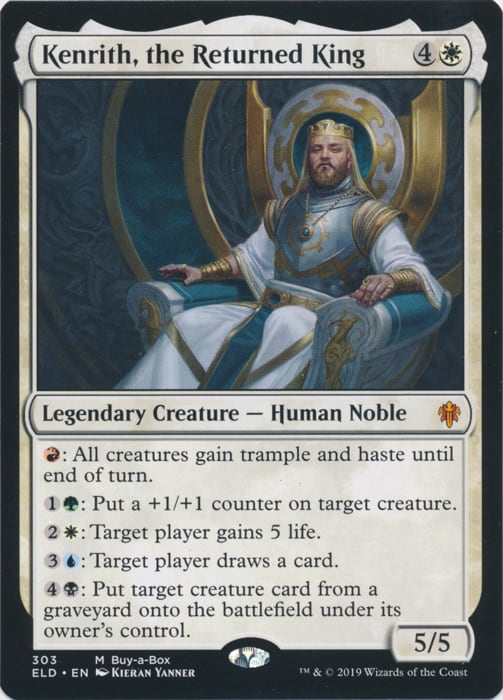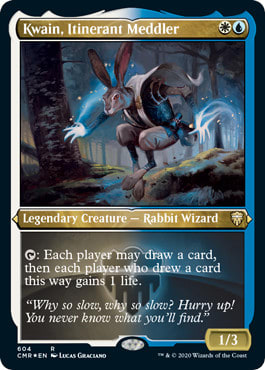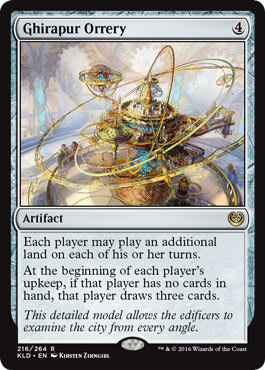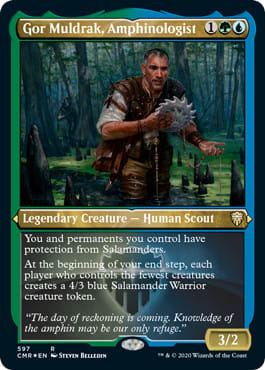I talk a lot about deck construction in my writing. Not just individual card choices, but the decision process which leads to those particular choices. Commander choice, thematic decisions, what the deck is trying to do: all those things are most often decided before most cards are chosen. We see a new Legendary creature spoiled and we go from there. We want to build Elk tribal. We try to figure out how to win with a bunch of non-creature Artifacts. Whatever it is, we make some of these decisions and go from there.
However, the common aspect of all these things is the goal is ultimately the same: we're trying to figure out how to win a game of commander. Some of us know a given deck is more or less competitive (I know, for example, when I play my Narset, Enlightened Master deck, with her infinite turns and combat steps, I'm playing in a much more competitive space than if I play my Trostani, Selesnya's Voice big tokens deck); but, ultimately we have a plan to win the game, and we spend the course of the game attempting to achieve that goal.
But one of the fun things about looking at decks the way this series does is it lets us consider all of the aspects of the game. So, as I think about where I want to spend my energy for four articles, I try to consider everything, even the parts we kind of take for granted. What happens, I thought, if we look at a set of decks which don't try to win?
So that's what we're going to do. We're going to start with a budget of $150 and go up from there, but all of the next few decks will have a different goal in mind when they're shuffled up. Remove "winning" from the equation. In fact, winning a game (as in, being the last player with a life total, no Commander damage over 21 from a single commander, and cards left in the library) would be a loss for all of these decks. The very intention of the deck will be something else.
And I want to start with what is probably the most common deck archetype which doesn't try to win, Group Hug or, as I like to call it for these purposes, "Hugs for people who need them." (The basic premise for this article comes from an excellent article written by fellow Commander writer Connor McCleod a couple of years ago called "Choosing Equity over Equality". If you haven't read it, consider reading it before proceeding, but the gist of his argument is as follows. "Equality" is where most Group Hug decks live; that is, everyone draws extra cards and gets extra mana. The problem is most Commander games are naturally lopsided. At any given time, there are people who are behind, people who are ahead, people who are stuck and people whose decks are humming perfectly. Instead, McCleod says, Group Hug decks should focus on "equity", where the Hug player attempts to help those who need it, not everyone equally.)
Therefore, our goal is to make a game last as long as possible and give everyone else as good a chance at winning as every other player at the table. We're also going to be an agent of fun, though! We're going to accelerate the game through the mid-point and get people to their big mana and splashy plays sooner, so rather than suffering playing through an hour of people ramping and playing utility spells, we'll ride right past that and start playing our six and nine drops quickly. And while good ol' Phelddagrif is the classic "Hug" commander, there's a new King in town.
As Stefan would say, "this King has everything." We can give a player an opportunity to attack right away and with Trample, or buff up a creature mid-combat to make combat more equitable, or give a dying player some extra life or more resources, or even buy back a much-needed blocker or utility creature. This is what we're talking about!
The deck is roughly broken into three main sections, and the first two can be subdivided into "for everyone" and "for someone". Rather than go through our normal "My Deck Tickled a Sliver" method, it makes more sense to look at the ways in which the deck (and, probably, all the decks trying not to win) is doing what it does. We'll call the three categories Extra Mana, Extra Cards, and Stopping the Game from Being Terrible. Let's break it down.
Extra Cards
Commander is, at its core, a lopsided game of resources. For every card the game forces you to draw, your opponents draw three (assuming a pod of four). That means you're always behind, so everyone will benefit from some extra cards. Therefore, we have ways for the whole table to draw some extra juice to keep up. Some of them are classics like Howling Mine and Font of Mythos. Play the artifact, everyone gets an extra card or two until it goes away. Folio of Fancies helps with this, since it makes it so there is no maximum hand size, so no one has to discard away their extra stuff. Heartwood Storyteller is another one of these but is a bit more lopsided, because everyone gets extra cards except the person trying to do things which will probably attempt to end the game. Kwain, Itinerant Meddler will likely cause people to not want to Wrath the board, because extra cards + extra life is great for everyone.
But take a look at Intellectual Offering. We get to choose another player and give them an Ancestral Recall and untap all their permanents. This is a great way to help someone behind on cards and mana, or just give them a shot at surviving a lethal attack by giving them their creatures back to block. Secret Rendezvous is similar on the card front, though not at Instant speed. But it still can help just one player who needs the extra juice to catch up, rather than accelerating everyone and leaving them in the same position with more cards. Khorvath's Fury is the first of a few examples of "Friend or Foe," where we can offer cards to anyone who needs them, while knocking down people who don't a bit. Even Infernal Offering is similar; yes, they'll have to sac a creature, but they get two cards for their trouble and they can return that creature - or something better! - at the same time. Scheming Symmetry isn't card draw, but if there's a player who's saying "if only I had X card, I could survive the next turn" it'll be great, because they can go get that exact card to draw on their next turn.
Extra mana
Ghirapur Orrery is pretty necessary in a build like this one, because an extra land drop every turn is really awesome. It will move the game along quickly for sure. Of course, some decks run more lands than others, so some players will get more benefit from the ability than others. That's where something like Tempting Contract comes into play, because now everyone gets more mana no matter how many lands they've got in their hand. Dictate of Karametra still benefits those with more lands, but it's helpful to everyone, because while the player with nine lands can make 18, at least the player stuck on three can make six. Tempt with Discovery is great for everyone because it searches for any land, so someone can get a dual to cover more bases or a needed Temple of the False God to catch back up. Pir's Whim is similar except we get to choose who gets the land, then push those ahead a bit behind with a forced sacrifice (there's that Friend or Foe thing again). And Collective Voyage should be awesome for everyone, but especially a budget player who may not be running as many non-Basics. Kynaios and Tiro of Meletis is good for people too, because if you don't have the land to play, at least you get a card for your trouble.
Stopping the Game from Being Terrible
Here's where we move away from my original understanding of Group Hug. We're running a whole bunch of cards with specific capabilities to keep players in the game and make it more equitable. Let's start with Gor Muldrak, Amphinologist and his bizarre "Protection from Salamanders" clause. Whichever player has the fewest creatures (and therefore, most likely, is behind) gets a free 4/3. It's nice they can't attack us with them, but we are only concerned with our life total so we can keep the game going. Hunted Dragon and a few other Hunted creatures create a whole board state for people who are behind; sometimes a Wrath effect leaves someone wide open to a faster rebuilding, and having a few chump blockers can make all the difference.
We're also running five Advocates - Forcemage, Nullmage, Pulsemage, Shieldmage, and Spurnmage. These dudes all have different abilities, but it's the cost of their activated abilities we're likely more interested in, because along with tapping them, we return cards from graveyards to our opponents' hands. Someone being walloped with a big tramply thing? Shieldmage Advocate will stop the damage and put that Ghostly Prison back in their hand, ready to be recast and slow the assault. Spurnmage Advocate is similar but destroys the attacking creature. Pulsemage Advocate can buy back our Farsight Adept and return three key cards to an opponent, getting them back in the game. The utility here is excellent and should be very useful to our goals.
Skullwinder, in particular, is a good one. Sometimes it's an early game play, returning a Burnished Hart to help with mana acceleration. Other times it's a late game thing, bringing back Avacyn, Guardian Angel to protect a player.
A few other cards of note. Lightmine Field will hold off combat for a while. Zndrsplt's Judgement balances the playing field. Disrupt Decorum can force the game into an attack we can then manipulate. Will Kenrith and Rowan Kenrith both give us multiple abilities we can use to steer the game into equity. Abyssal Persecutor keeps everyone else alive no matter what happens. And a slate of Counterspell-style cards let us stop an otherwise game-winning combo.
Kenrith Group Hug | Commander | Mark Wischkaemper
- Commander (1)
- 1 Kenrith, the Returned King
- Creatures (21)
- 1 Abyssal Persecutor
- 1 Farsight Adept
- 1 Forcemage Advocate
- 1 Gor Muldrak, Amphinologist
- 1 Heartwood Storyteller
- 1 Hunted Dragon
- 1 Hunted Lammasu
- 1 Hunted Phantasm
- 1 Hunted Troll
- 1 Kami of the Crescent Moon
- 1 Kwain, Itinerant Meddler
- 1 Kynaios and Tiro of Meletis
- 1 Nullmage Advocate
- 1 Phelddagrif
- 1 Pulsemage Advocate
- 1 Questing Phelddagrif
- 1 Shieldmage Advocate
- 1 Skullwinder
- 1 Spurnmage Advocate
- 1 Tidal Barracuda
- 1 Zhur-Taa Ancient
- Planeswalkers (2)
- 1 Rowan Kenrith
- 1 Will Kenrith
- Instants (5)
- 1 Arcane Denial
- 1 Benevolent Offering
- 1 Counterspell
- 1 Familiar's Ruse
- 1 Intellectual Offering
- Sorceries (15)
- 1 Collective Voyage
- 1 Disrupt Decorum
- 1 Hypergenesis
- 1 Infernal Offering
- 1 Khorvath's Fury
- 1 Minds Aglow
- 1 Pir's Whim
- 1 Prosperity
- 1 Regna's Sanction
- 1 Secret Rendezvous
- 1 Sylvan Offering
- 1 Tempt with Discovery
- 1 Virtus's Maneuver
- 1 Winds of Abandon
- 1 Zndrsplt's Judgment
- Enchantments (8)
- 1 Curse of Echoes
- 1 Curse of Exhaustion
- 1 Dictate of Karametra
- 1 Dictate of Kruphix
- 1 Heartbeat of Spring
- 1 Lightmine Field
- 1 Rites of Flourishing
- 1 Well of Ideas
- Artifacts (7)
- 1 Elixir of Immortality
- 1 Folio of Fancies
- 1 Font of Mythos
- 1 Ghirapur Orrery
- 1 Howling Mine
- 1 Temple Bell
- 1 Tempting Contract
- Lands (40)
- 1 Mountain
- 1 Swamp
- 4 Forest
- 4 Plains
- 5 Island
- 1 Arcane Sanctum
- 1 Choked Estuary
- 1 Crumbling Necropolis
- 1 Foreboding Ruins
- 1 Fortified Village
- 1 Frontier Bivouac
- 1 Jungle Shrine
- 1 Mikokoro, Center of the Sea
- 1 Mystic Monastery
- 1 Nomad Outpost
- 1 Opulent Palace
- 1 Port Town
- 1 Sandsteppe Citadel
- 1 Savage Lands
- 1 Seaside Citadel
- 1 Temple of Abandon
- 1 Temple of Deceit
- 1 Temple of Enlightenment
- 1 Temple of Epiphany
- 1 Temple of Malady
- 1 Temple of Malice
- 1 Temple of Mystery
- 1 Temple of Plenty
- 1 Temple of Silence
- 1 Temple of Triumph
The two main things to think about when playing this deck are a) stop trying to win (seriously, don't consider it. If it's down to you and one other player, let them kill you) and b) careful threat assessment. Do your best to honestly think about who needs help, who's ahead, and what can you do to bring that to parity. It should be fun and challenging to do, but it will also help your game when you're playing a deck to actually win, because you'll be better at figuring out who is the threat and who can be picked off easily!
What else would you run in this deck? Please let me know in the comments. Any other thoughts on Hugs in Commander?
Forbidden Orchard got cut to make the budget, but I think it would be a useful addition. Without it, the budget squeaked under at $149.93 as of this writing.
Thanks for reading.

























